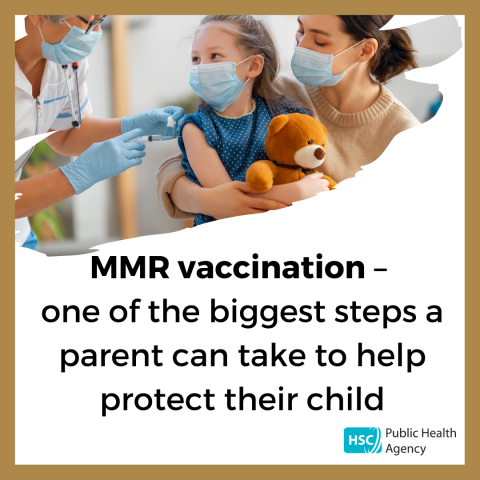MMR vaccination – one of the biggest steps a parent can take to help protect their child

The Public Health Agency (PHA) is urging parents not to put off getting their child vaccinated against childhood illnesses such as measles, mumps and rubella.
Many childhood diseases that were common in the UK prior to the introduction of vaccination have been dramatically reduced or have disappeared altogether. However, once a disease fades from prominence, it is easy to forget how serious it can be. Unfortunately, unless vaccine uptake remains high in Northern Ireland, many of these deadly diseases will return from parts of the world where they still occur.
The MMR (measles, mumps and rubella) vaccination is a key story. From the 1940s onwards, annual notifications of measles varied between 160,000 and 800,000, with around 100 deaths from acute measles each year in the UK. Although a measles vaccine was first introduced in 1968, uptake was low, meaning that there was still a high prevalence through the 1970s and 80s, and children still died.
The MMR vaccine was launched in 1988 when there were still over 80,000 annual notifications of measles across the UK. The year after the vaccine was introduced, the figure dropped to just over 25,000, and continued to fall. Thanks to the high proportion of people in Northern Ireland making the positive decision to get the MMR vaccine over the past decades, cases of these three illnesses here remain low. However, these diseases have not gone away so we cannot afford to become complacent. Ensuring your children have had two doses of MMR vaccine will give them the best protection.
Dr Jillian Johnston, Joint Interim Assistant Director in Health Protection at the PHA, said: “In the last four years we have seen uptake rates decline in line with the rest of the UK by a small but steady amount. This had started to plateau, but with the impact of the COVID-19 pandemic, there is concern that it may worsen. Currently uptake of the first dose of the MMR vaccine in two year olds sits at 95.4% (July-Sept 2021), but only 89.1% of five year olds have had the recommended two doses.
“It is possible that during COVID-19 pandemic some parents may have been cautious about going to their GPs, not wanting to burden them or they did not realise they were still offering routine immunisations.
“If your child has missed a vaccination, please contact your GP practice to book an appointment as soon as you can to make sure they have maximum protection against disease. The school-based vaccination programme, which includes the HPV, school leavers’ booster and menACWY is also continuing, so don’t forgot to sign and return consent forms when you receive them.
“The other concern is that the misinformation that has been spread about the COVID-19 vaccine may have impacted the childhood immunisation programme. Like all vaccines approved for use in the UK, the MMR vaccine has gone through several stages of lab tests and clinical trials ensuring it is safe and effective. It’s important to be informed about all vaccines, but there is lots of misinformation out there. Make sure your facts come from a reliable source, like the PHA, your own GP or health visitor.
“The immunisation team at the PHA ensures the population is offered maximum protection against vaccine-preventable diseases by working with health visitors, school nurses, schools and GP practices.”
Dr Johnston continued: “Overall, Northern Ireland has uptake rates above the UK average. However, some vaccines have seen a decline in uptake, albeit a small one.
“People may have forgotten or have never had the experience in their lifetime of seeing the devastation that measles, polio or whooping cough can have on a community.
“But it is only when people continue to get their children and themselves vaccinated in large numbers that we can prevent these diseases, and the possible deaths resulting from them, so it is vitally important that we don’t take our health and that of our children for granted. Not only that, but getting kids vaccinated also helps protect those who aren’t yet eligible for vaccination, such as tiny babies.
“After clean water, vaccination is the most effective public health intervention in the world for saving lives and promoting good health, and therefore one of the most important things that any parent can do is get their child vaccinated and encourage them to continue this throughout their own lifetime.”
For further information on childhood immunisation see -
- www.publichealth.hscni.net/publications/immunisation-babies-year-old-english-and-10-translations
- www.publichealth.hscni.net/publications/immunisation-babies-just-after-their-first-birthday-english-and-translations
- www.publichealth.hscni.net/publications/immunisation-pre-school-children-three-years-and-four-months-old-english-and-translatio
